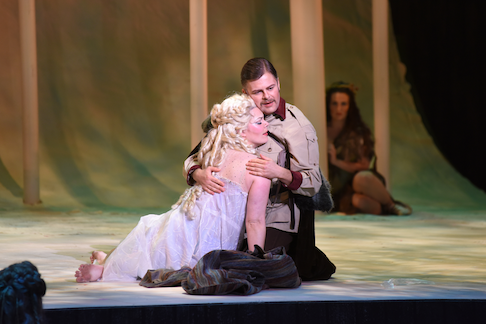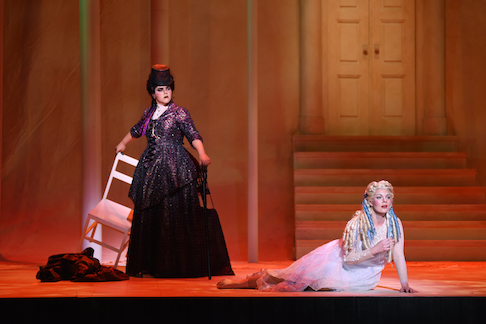Recently in Performances
English Touring Opera are delighted to announce a season of lyric monodramas to tour nationally from October to December. The season features music for solo singer and piano by Argento, Britten, Tippett and Shostakovich with a bold and inventive approach to making opera during social distancing.
This tenth of ten Live from London concerts was in fact a recorded live performance from California. It was no less enjoyable for that, and it was also uplifting to learn that this wasn’t in fact the ‘last’ LfL event that we will be able to enjoy, courtesy of VOCES8 and their fellow vocal ensembles (more below …).
Ever since Wigmore Hall announced their superb series of autumn concerts, all streamed live and available free of charge, I’d been looking forward to this song recital by Ian Bostridge and Imogen Cooper.
Although Stile Antico’s programme article for their Live from London recital introduced their selection from the many treasures of the English Renaissance in the context of the theological debates and upheavals of the Tudor and Elizabethan years, their performance was more evocative of private chamber music than of public liturgy.
Evidently, face masks don’t stifle appreciative “Bravo!”s. And, reducing audience numbers doesn’t lower the volume of such acclamations. For, the audience at Wigmore Hall gave soprano Elizabeth Llewellyn and pianist Simon Lepper a greatly deserved warm reception and hearty response following this lunchtime recital of late-Romantic song.
For this week’s Live from London vocal recital we moved from the home of VOCES8, St Anne and St Agnes in the City of London, to Kings Place, where The Sixteen - who have been associate artists at the venue for some time - presented a programme of music and words bound together by the theme of ‘reflection’.
'Such is your divine Disposation that both you excellently understand, and royally entertaine the Exercise of Musicke.’
‘And there was war in heaven: Michael and his angels fought against the dragon; and the dragon fought and his angels, And prevailed not; neither was their place found any more in heaven … that old serpent … Satan, which deceiveth the whole world: he was cast out into the earth, and his angels were cast out with him.’
There was never any doubt that the fifth of the twelve Met Stars Live in Concert broadcasts was going to be a palpably intense and vivid event, as well as a musically stunning and theatrically enervating experience.
‘Love’ was the theme for this Live from London performance by Apollo5. Given the complexity and diversity of that human emotion, and Apollo5’s reputation for versatility and diverse repertoire, ranging from Renaissance choral music to jazz, from contemporary classical works to popular song, it was no surprise that their programme spanned 500 years and several musical styles.
The Academy of St Martin in the Fields have titled their autumn series of eight concerts - which are taking place at 5pm and 7.30pm on two Saturdays each month at their home venue in Trafalgar Square, and being filmed for streaming the following Thursday - ‘re:connect’.
The London Symphony Orchestra opened their Autumn 2020 season with a homage to Oliver Knussen, who died at the age of 66 in July 2018. The programme traced a national musical lineage through the twentieth century, from Britten to Knussen, on to Mark-Anthony Turnage, and entwining the LSO and Rattle too.
With the Live from London digital vocal festival entering the second half of the series, the festival’s host, VOCES8, returned to their home at St Annes and St Agnes in the City of London to present a sequence of ‘Choral Dances’ - vocal music inspired by dance, embracing diverse genres from the Renaissance madrigal to swing jazz.
Just a few unison string wriggles from the opening of Mozart’s overture to Le nozze di Figaro are enough to make any opera-lover perch on the edge of their seat, in excited anticipation of the drama in music to come, so there could be no other curtain-raiser for this Gala Concert at the Royal Opera House, the latest instalment from ‘their House’ to ‘our houses’.
"Before the ending of the day, creator of all things, we pray that, with your accustomed mercy, you may watch over us."
The doors at The Metropolitan Opera will not open to live audiences until 2021 at the earliest, and the likelihood of normal operatic life resuming in cities around the world looks but a distant dream at present. But, while we may not be invited from our homes into the opera house for some time yet, with its free daily screenings of past productions and its pay-per-view Met Stars Live in Concert series, the Met continues to bring opera into our homes.
Music-making at this year’s Grange Festival Opera may have fallen silent in June and July, but the country house and extensive grounds of The Grange provided an ideal setting for a weekend of twelve specially conceived ‘promenade’ performances encompassing music and dance.
There’s a “slide of harmony” and “all the bones leave your body at that moment and you collapse to the floor, it’s so extraordinary.”
“Music for a while, shall all your cares beguile.”
The hum of bees rising from myriad scented blooms; gentle strains of birdsong; the cheerful chatter of picnickers beside a still lake; decorous thwacks of leather on willow; song and music floating through the warm evening air.
Performances
![Sara Gartland as Rusalka [Photo by Tim Trumble]](http://www.operatoday.com/Rusalka%20dress-14.png)
26 Nov 2016
Rusalka, AZ Opera
On November 20, 2016, Arizona Opera completed its run of Antonín Dvořák’s fairy Tale opera, Rusalka. Loosely based on Hand Christian Andersen’s The Little Mermaid, Joshua Borths staged it with common objects such as dining room chairs that could be found in the home of a child watching the story unfold.
With water-reflected light bathing the stage, Water Nymph Rusalka and her sisters “swam” sitting on the backs of chairs and waving their arms much as Russian ballerinas do in The Dying Swan.
Their world was separated from the world of humanity by a forbidding white door. Water nymphs and wood sprites wore ethereal gowns that moved gracefully with them and allowed the audience to perceive them as denizens of a different realm. Melinda Whittington was a poignant, tragic Rusalka who enchanted the audience and brought them into her world with her moon song “Mesiku na nebi hlubokem” (“O moon high up in the sky”).
 Sara Gartland and David Danholdt as Rusalka and The Prince
Sara Gartland and David Danholdt as Rusalka and The Prince
When Rusalka fell in love with the human Prince, her father, Vodnik, sung magnificently by Richard Paul Fink, warned her that no good could come of the match because humans are sinful. I wonder if Dvořák got his idea for Vodnik and the Three Wood Sprites from Wagner's Das Rheingold. Vocally, the combination of stentorian baritone and three high lyric voices was fascinating. Daveda Karanas was a human looking Ježibaba. With no pointed ears or other marks of an alien being, she wore a dress with a cut-out bustle that would have been quite fashionable in 1890s. She sang with dramatic vocal colors, but her characterization was rather bland.
Kevin Ray was a dramatic-voiced Prince whose character was bewildered by two women, Rusalka and the Foreign Princess, vying for his hand. Alexandra Loutsion was every inch the evil Foreign Princess and she sang with easily produced warm and resonant dramatic notes that made me wonder if she is a future Wagnerite. In this fairy tale, the Foreign Princess got the Prince’s ring and eventually shoved the social climbing water nymph back into her pond. That was a sad lesson, indeed, but one that must sometimes be learned.
 Daveda Karanas and Sara Gartland as Ježibaba and Rusalka
Daveda Karanas and Sara Gartland as Ježibaba and Rusalka
Kevin Newell was a dutiful hunter, but The Gamekeeper in a scruffy wig and the cowardly but limber Kitchen Boy supplied the comic relief that kept Rusalka from being totally tragic opera. Henri Venanzi’s chorus never appeared in front of the curtain and I wondered why. He has a good group but they might have seemed too earthbound for nymphs or sprites.
Dvořák’s music is exquisite and Conductor Steven White presented it in all its liquid, translucent beauty. Although memorable, the moon song is not the only great piece in this opera. There are many other scenes of similar evocative lyricism. The duet between Rusalka and the Prince has been described as one of the most enchantingly nuanced in all opera. Rusalka is a work we need to hear again so that we can get to know and understand its melancholy charm. I hope it won’t be too long before a company in Arizona or Southern California again presents Rusalka. It’s well worth hearing more than once.
Maria Nockin
Cast and production information:
Conductor, Steven White; Stage Director, Joshua Borths; Set Design, Mark Halpin; Costume Design, Adriana Diaz; Lighting Design, Jeremy Dominik; Choreographer, Molly Lajoie; Rusalka, Melinda Whittington; The Prince, Kevin Ray; Vodnik, Richard Paul Fink; Ježibaba, Daveda Karanas; The Foreign Princess, Alexandra Loutsion; Wood Sprites: Katrina Galka, Lacy Sauter, and Mariya Kaganskaya; Gamekeeper, Joseph Lattanzi; Kitchen Boy, Alyssa Martin; The Hunter, Kevin Newell; Chorus Director, Henri Venanzi.
![Sara Gartland as Rusalka [Photo by Tim Trumble]](http://www.operatoday.com/Rusalka%20dress-14.png)

